Hancock and Washington Counties Master Gardener Volunteers News – April 2022
Table of Contents
PLANT SALE/OPEN HOUSE | BUTTERFLY BASICS | WORKSHOP| SPRING WELLNESS MONTH MGV PROFILE | OUR ADVISORY & EXEC COMMITTEES! | FLASH IN THE PANS| REPORTING HOURS
Upcoming Dates to Remember!
April 11: Spring Wellness session – Chi-Gong for Master Gardeners: Building Strength, Flexibility and Balance
April 12: Butterfly Garden Basics with Martina
April 18: Spring Wellness session – Self-Directed Biofeedback fo Stress Relief
April 18: Patriot’s Day – office closed
April 29: Designing Welcoming Landscapes
May 21: MGV Plant Sale & Open House
June 27: FLASH in the Pans Steel Drum Band Fundraiser
2022 Spring Plant Sale and Outdoor Open House Scheduled: Saturday May 21
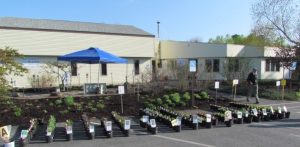 Help us raise funds to support the Hancock County Master Gardener Volunteers Program by donating perennial divisions from your garden for our 2022 spring plant sale! We are looking for divisions of herbaceous perennials, with a strong desire for native plants, and non-native ornamentals that are attractive to a wide variety of insects (to promote garden biodiversity).
Help us raise funds to support the Hancock County Master Gardener Volunteers Program by donating perennial divisions from your garden for our 2022 spring plant sale! We are looking for divisions of herbaceous perennials, with a strong desire for native plants, and non-native ornamentals that are attractive to a wide variety of insects (to promote garden biodiversity).
TIMELINE FOR DONATING PLANTS:
WE WOULD LOVE YOUR PLANT DONATIONS IN FIRST THREE WEEKS OF APRIL. Our hope is to have all perennials potted up for our sale no later than Friday April 22. This gives them four weeks to develop new roots in their pots before our plant sale on Saturday morning May 21.
PROCESS FOR DONATING YOUR PLANTS:
- Email Marjorie (marjorie.peronto@maine.edu) with a list of plants you are able to donate. Please await confirmation from Marjorie before making any donations.
- NEW PROTOCOL FOR TRANSPORTING PLANTS: Plants dug from your garden must donated to Extension BARE ROOT so we do not inadvertently transport noxious weed seeds or rhizomes, invasive jumping worm cocoons, or invasive insects (such as European red ants or winter moth larvae). We must minimize the movement of soil from one place to another. Cooperative Extension can provide you with moist wood shavings to place around roots, or you can wrap roots in moist newspaper and place in a plastic bag to keep them hydrated during transportation and storage prior to potting.
- LABELING YOUR PLANTS: please include the following with each plant donation:
-
- your name and phone #,
- common name and scientific name (genus, species, variety if you know it),
- bloom color, and
- a picture would be awesome if at all possible!
Please be as thorough as possible with your labeling, as we cannot sell plants if we do not know what they are!
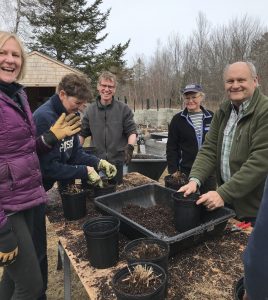
THREE OPTIONS FOR GETTING YOUR PLANTS TO US:
- Drop your divisions at the Extension Office in Ellsworth with a label (bare root, healed in with moist Promix, peat, or moist wood shavings provided by the Extension office, or roots wrapped in moist newspaper and bagged in plastic (Marjorie needs to know ahead of time when you are coming!)
- Dig plants at home and request that volunteers pick them up (bare root, protect roots with moist Promix, peat, or moist wood shavings, or roots wrapped in moist newspaper and bagged in plastic.)
- Request that volunteers come dig from your garden.
If you have any questions send an email to Marjorie at marjorie.peronto@maine.edu
THANK YOU!
Butterfly Garden Basics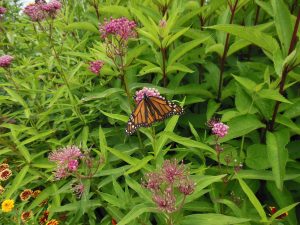
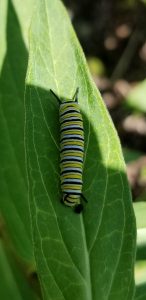
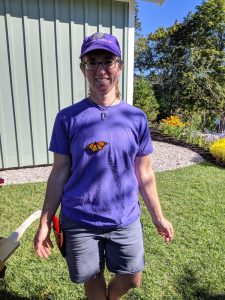
Have you wanted to start or improve a butterfly garden? In the workshop you will learn about butterfly biology, such as their life cycle, behaviors, and adaptations. The most common butterflies of Maine will be introduced along with the plants they nectar and lay their eggs on. You will learn some ideas for plants and flowers to place in your yard or garden to attract butterflies. There will also be photographs of Charlotte Rhodes Butterfly Park in Southwest Harbor in order to obtain some inspiration for planning a garden.
MGV, Martina Dittmar has volunteered to present this session which will be hosted by Marjorie Peronto from noon-1:00 PM on Tuesday, April 12. If you haven’t already – Remember to register in advance for this continuing education workshop offered for Hancock and Washington County MGV’s. Please contact Sue Baez at sue.baez@maine.edu to request the Zoom link for the presentation.
WORKSHOP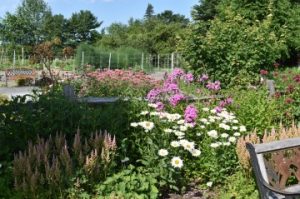
Designing Welcoming Landscapes – Webinar
Friday, April 29, 2022
12:00 Noon to 1:15 PM
Our landscapes have become more important living spaces, not just for entertainment, but for everyday life. From play spaces for children to outdoor rooms for quiet conversations, this workshop will guide you through some important questions to consider when evaluating your space and offer specific examples of ways to make landscapes more fun, comfortable and safe for all ages.
Register Here
Coming up!
Spring Wellness Workshops Series for Master Gardener Volunteers
In the spirit of building resiliency in our MGVs as we start to gear up for another busy growing season in 2022, please join this four-part (2 sessions remaining) program begun by the Hancock and Washington County MGVs in 2020. Wellness workshops are offered via Zoom at no cost to current MGVs and are taught by fellow MGVs or other skilled/trained/certified local self-care experts. Take advantage of this chance to explore new knowledge of what and how we can maintain and strengthen ourselves!
We will use the same Zoom link for each session, and you don’t have to preregister. Just join us. Please mark your calendar:
- Monday April 11, 12-1 pm. Chi-Gong for Master Gardeners: Building Strength, Flexibility and Balance, with Nancye Files
- Monday April 18, 12–1 pm. Self-Directed Biofeedback for Stress Relief, with Jen Harry
For more information about each session, and to obtain the ZOOM link, visit: SPRING WELLNESS WORKSHOPS
Password: ladybug
MGV Profile
Elizabeth Byard, MGV class of 18′
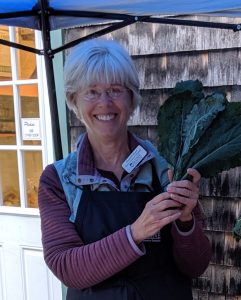
Why did you decide to become a Master Gardener Volunteer?
Gardening was instilled in me at a young age. We lived on a small farm: 2 pigs, a few cows and a flock of chickens (cats and a dog of course as well) and a very large garden. My father and the six children helped plant and care for the garden while mom and the six children helped with preserving the harvest. I see plants as a miracle and a gift from the earth. My career was devoted to healthcare though I had retirement plans to apply to the Master Gardener Volunteer program. I was pleased to have the opportunity to join this wonderful program and begin my new career.
Where have you volunteered?
I have volunteered at the Hancock County Cooperative Extension Gardens and Hoop House enjoying contributing to the beauty and bounty all the while learning more about plants and gardening – practicing my new skills. I have enjoyed taking that bounty to Loaves and Fishes as an Eat Well Volunteer. From food to flowers I have volunteered and also worked as a docent at The Charlotte Rhoades Park and Butterfly Garden.
What does gardening do for you?
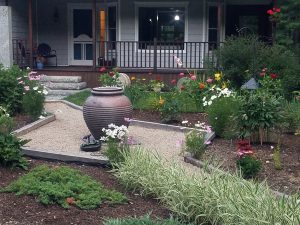
Gardening always reminds me of the miracle of nature. I so enjoy the sights and scents of the plants plus the watching and waiting for them to present their gifts to me. I particularly enjoy growing herbs. Nature gave them the best scents and it is so fun to begin cooking our evening meal and pop out the door to harvest a bit of this and that for the dish. Gardening is an outdoor activity so sunshine and fresh air plus a rain shower or two are added bonuses. I enjoy the plant sharing in our neighborhood and with other Master Gardener Volunteers – making human connections through our shared interests.
How has your garden evolved/changed over the years?
A very memorable MGV class was Reeser and Marjorie’s class on Gardening for Biodiversity. They shared a video of the life in their garden. It was such an awakening to me. From that moment on I have worked to provide a habitat rather than a front yard. I think about the trees and the canopy so
What are “best practices” used in your garden?
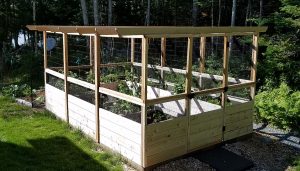
To start I am choosing plants based on their contribution to biodiversity and pollinator friendliness as well as keeping in mind native plants. I try to avoid plants that have pest problems. I keep two compost bins for use as fertilizer as well as making seaweed tea. I have added a bee house and a bird bath. I have eliminated all but one invasive species. The hardest part is to protect plants from deer. In this effort we have added some fencing and an enclosed raised bed garden. When amendments are needed for starting a new bed organic compost is chosen. I have installed solar motion detector lighting and am using a battery operated mower/mulcher.
How has climate change influenced your gardening?
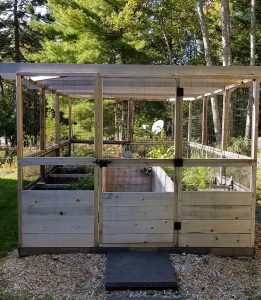
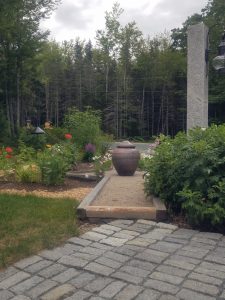 I am more aware of where I choose to put a particular plant as our south facing side is too hot and dry for a lot of plants. I am learning more about using companion plants and edible gardens in order to minimize mulch use. Letting the plants shade each other during dry times and increasing food production in the garden is a goal.
I am more aware of where I choose to put a particular plant as our south facing side is too hot and dry for a lot of plants. I am learning more about using companion plants and edible gardens in order to minimize mulch use. Letting the plants shade each other during dry times and increasing food production in the garden is a goal.
How Do We Make Our Garden Grow? Advisory and Executive Committees
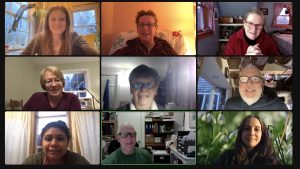
Like many a grand garden, our UM Cooperative Extension and Master Gardener Volunteer programs are supported by some good hardscaping and beneficial soil microbes keeping our programs supported and nourished.
The hardscaping was constructed as part of the Smith-Lever Act of 1914, creating a University Cooperative Extension Service to extend university knowledge to area citizens. It called for each Extension to have an Executive Committee, with its major responsibility to prepare and submit an annual budget to local county commissioners. The Committee also are stewards of the buildings and grounds, making the building sound, including recent efforts towards energy efficiency. Members have knowledge of all programs at the Cooperative Extension: sustainable agriculture and horticultural programming; food security programming; 4H youth development; small business development; and community development. Each monthly Executive Committee meeting starts with 15 minutes devoted to learning about a current issue or a part of the current programs. For instance, this Fall’s Annual Meeting is set to have a speaker talk about PFAS (forever chemicals in the news of late), and what the Extension is doing in response. Thus, members can be informed ambassadors, sharing about and advocating for the Cooperative Extension to their communities. Executive Committee members also are alert to any needs in the community that might be able to be met by the Extension service. Our Executive Committee hardscaping does more than provide a supportive structure for the programs, it helps acts as a conduit for sharing both ways between Cooperative Extension representatives and our communities.
Marjorie shared 2 of many highlights she is grateful for with Executive members. She’s very proud of how members represent Hancock County Extension to the county commissioners at annual budget meetings, knowing that it’s “no mean feat” to be on the hot seat in this forum. She values that the building and grounds are warm, welcoming, comfortable and safe for participants of Extension programs and the public who stop in.
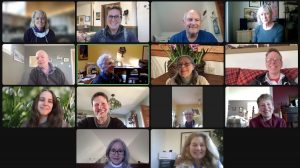
Our Master Gardener Volunteer (MGV) Advisory Committee is homegrown, and came to be during an informal conversation amongstMarjorie and 6 MGV’s in 2004. There was a sense that the MGV program could be more expansive and that volunteers were not as fulfilled as they could be. These 6 were interested in helping lead change. An email survey to all active MGV’s led to identifying priority needs for the program: improving communication; strengthening volunteer management; offering advanced trainings. MGV members were nominated for a Committee, and the Committee worked through how it could be organized to meet this vision of a working advisory group. Their first significant task was how to strengthen and support MGV Projects (2005). This led to Project Leaders, on site instruction, project goals, yearly application for project status, and visits to the projects to help with connection and communication. Advisory also worked on MGV retention, within the program and within working on a project. Their first efforts focused on the project experience and adding a Mentor Program (2011). Exit Interviews were added (2013) to listen to members departing Advisory Committee about their experience and how the committee could be strengthened or maintained. Our book group (2009), field trips (2009), and specialized trainings (2010) emerged out of these conversations and continue now.
The MGV Advisory also bolstered recognition of volunteers and their accomplishments, with an annual formal recognition event (2005) and recognition for years and hours of service – our yearly pins (unique to our program) and “team swag” hats, shirts, or sweatshirts. The Advisory Committee was so novel that Marjorie presented about its evolution, goals and successes in 2016 at the National Association of County Agriculture Agents Annual Meeting. Her talk was titled, “A Master Gardener Advisory Committee Can Explode Your Program and Help You Retain Your Sanity.” In 2022, there are only 2 other counties in Maine that have an MGV Advisory Committee.
While Marjorie does bring program needs to the Advisory Committee that can shape Advisory’s work for a time, its yearly goals are really set and directed by its members to the needs they see that year. Like good soil bacteria, Advisory as a group and members help nourish a truly vibrant and productive program.
Marjorie expressed deep gratitude to both groups and all their members, for all that everyone has given and all that has been accomplished. “It’s the volunteers who make the Cooperative Extension work. I’m grateful for people willing to step forward to take a leadership role. It’s gold for us all.”
Save the Date!

Flash in the Pans Steel Drum Band – To Benefit the MGV Program
MONDAY JUNE 27, 7:30 – 9 PM,
BLUE HILL TOWN PARK
Shout out to all MGVs!
Know an MGV who’s done or is doing something intriguing or inspiring? Send in their name to MGVnewsletterinput@gmail.com; someone on the Newsletter team can follow up for a future newsletter spot. We know there are so many neat stories out there or MGVs finding ways to apply our training and experience.
Please be reminded to REPORT your Master Gardener Volunteer hours monthly
Volunteer Hours are due NOW – REPORT HERE
This month’s newsletter sent by Sue includes articles from our new “Communicate with MGV’s” task force. We’d like the next edition to feature your suggestions and articles about gardeners and gardens. Please contact us at MGVnewsletterinput@gmail.com with your ideas as we work on ways for us to stay in touch with all our gardening friends while following virus-safe guidelines.
